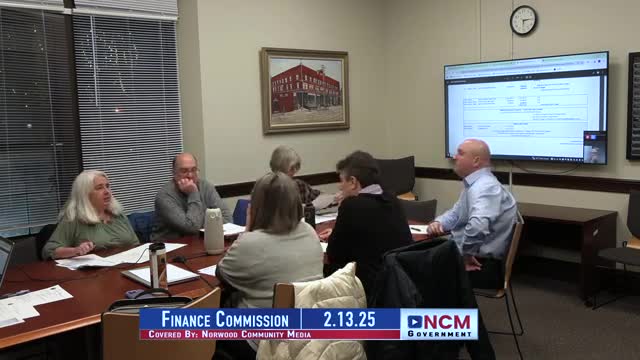Finance Commission presses for limits on using one‑time free cash in FY26; schools to receive limited new positions
Get AI-powered insights, summaries, and transcripts
Subscribe
Summary
Commission members warned against relying on one‑time free cash to fund recurring operations, proposed reserve uses and directed the budget balancing committee to reconvene Feb. 26 to refine recommendations for FY26 allocations including caps on school positions and targeted funding for contractual obligations.
The Finance Commission spent a substantial portion of the meeting on FY26 budget balancing and how to use the town’s large free‑cash balance. Commissioners said relying on one‑time funds to cover ongoing operations runs counter to the commission's financial policies and risks creating a fiscal cliff in future years.
Commissioners reported the town has approximately $20,000,000 in free cash (discussion figure from meeting) and debated options for allocating that money across operating budget needs, capital projects and reserves. The commission said it used about $5,000,000 of one‑time money last year and projected $7–9,000,000 might be used this year; members warned that continuing that pattern is unsustainable.
The nut graf: in negotiations with the schools and departments the commission agreed to fund contractual obligations and certain unavoidable items but urged sharper reductions in requested personnel and operating increases. For the schools the commission said it will provide contractual obligations, transportation costs and a limited number of additional middle‑school positions — capped at five — citing prior commitments tied to the middle‑school project.
Commissioners and the budget balancing committee proposed several reserve or earmark options for free cash: a special‑education reserve (SPED reserve) to cover unexpected out‑of‑district costs, additional deposits to the general stabilization fund, and consideration of a capital reserve (or asking the Board of Selectmen to consider a capital‑reserve warrant article). Staff and commissioners noted tradeoffs: placing money into named funds can limit later flexibility or require higher votes to spend, while leaving money in free cash preserves liquidity but offers less formal protection.
Commissioners discussed bond proceeds and the middle‑school project: the MSBA (state) provided additional funding and the bond proceeds are constrained by DOR/arbitrage rules; staff estimated about $10,000,000 (plus or minus) could remain from the middle‑school bond proceeds once projects settle, but those funds must be used on long‑lived projects consistent with the borrowing tenor.
The commission scheduled follow‑up: the budget balancing committee will reconvene Feb. 26 to refine recommendations for school and town targets, and commissioners agreed to seek a conversation with the Board of Selectmen about possible capital reserve arrangements or an MOA to guide free‑cash allocation decisions.
Ending: Commissioners emphasized they will protect contractual obligations while pushing for reduced recurring reliance on one‑time funds and will press departments to sharpen budget proposals ahead of town meeting.
